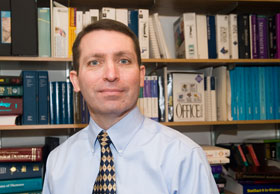  |
| HOME | THIS ISSUE | CALENDAR | GRANTS | BACK ISSUES | < BACK | NEXT > |
Metabolic syndrome a growing health threat, says researcherby Carolyn Pennington - January 22, 2007 | ||||
| Ten years ago, it was estimated that nearly 25 percent of Americans had metabolic syndrome, a group of health problems that increases the risk of heart attack, stroke, and diabetes. Stephen Walsh, associate professor of community medicine and healthcare, believes the number is now much higher.
With a grant from the Donaghue Foundation, Walsh has been analyzing the most recent data available, and has found that more than one-third of adults have metabolic syndrome. "From a public health perspective," he says, "if we don't do something, what we're apt to see 20, 30, 40 years from now is even more death from cardiovascular disease than what we currently see. And it's already the number one killer." Metabolic syndrome includes risk factors such as too much fat around the waist, elevated blood pressure, high triglycerides, elevated blood sugar, and low HDL cholesterol. It's caused by an unhealthy lifestyle that includes eating too many high-calorie foods, being inactive, and gaining weight, particularly around your stomach. Walsh's research is funded through a grant from the Patrick and Catherine Weldon Donaghue Medical Research Foundation. In 2005, the foundation established the Donaghue Nutrition Research Competition, with the goal of "jump-starting" new and innovative research on the role nutrition plays in preventing or reducing disease and helping achieve and maintain optimal health. The competition will run for five years at a total cost of $550,000. Walsh is one of four researchers who were awarded grants of between $10,000 and $100,000 during the first year. Other grant winners are UConn associate professors Nancy Rodriguez, nutritional sciences, who is researching leucine as a bioactive nutrient, and Robin Bogner, pharmaceutical sciences, who is studying enhancing calcium absorption in patients taking proton pump inhibitor drugs; and Dr. Sevkit Yigit of the Connecticut Children's Medical Center, who is studying vitamin D deficiency in children with cerebral palsy. "Because of the broad interest in and importance of nutrition and complementary and alternative medicine, the Donaghue Nutrition Research Competition promises to provide practical benefit to the citizens of Connecticut," says Dr. Anne Kenny, associate professor of medicine at the UConn Center on Aging, who helps review the grant proposals. "Ultimately, we are hopeful that the research conducted through this program will inform reliable health recommendations throughout the country and the world." Walsh has focused most of his research on autoimmune diseases. He says that until a year ago, he would not have considered doing nutrition research, but the grant provided an incentive. For his study on metabolic syndrome, Walsh gathered most of his information from the National Health and Nutrition Examination Survey conducted by the Centers for Disease Control between 1999 and 2004. The CDC did extensive medical examinations on 31,000 randomly selected Americans, and asked detailed lifestyle questions about their diet and weight control activities. Researchers are now trying to glean useful information from the data in hopes of improving the nation's overall health. Walsh decided to zero in on metabolic syndrome, which is often called the silent epidemic because so many people have the symptoms but don't know it. Pinpointing how many people have metabolic syndrome is the first part of Walsh's research. The second part entails determining how many of those afflicted are trying to lose weight. The final stage of his study will look at those who have been successful at losing weight and try to determine what distinguishes them from those who are unsuccessful. Walsh expects to conclude his study this spring and will submit it for publication in at least two major health and nutrition journals. |
| ADVANCE HOME UCONN HOME |

